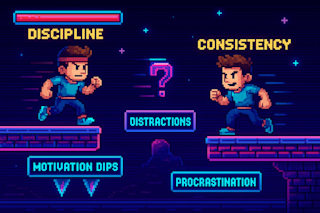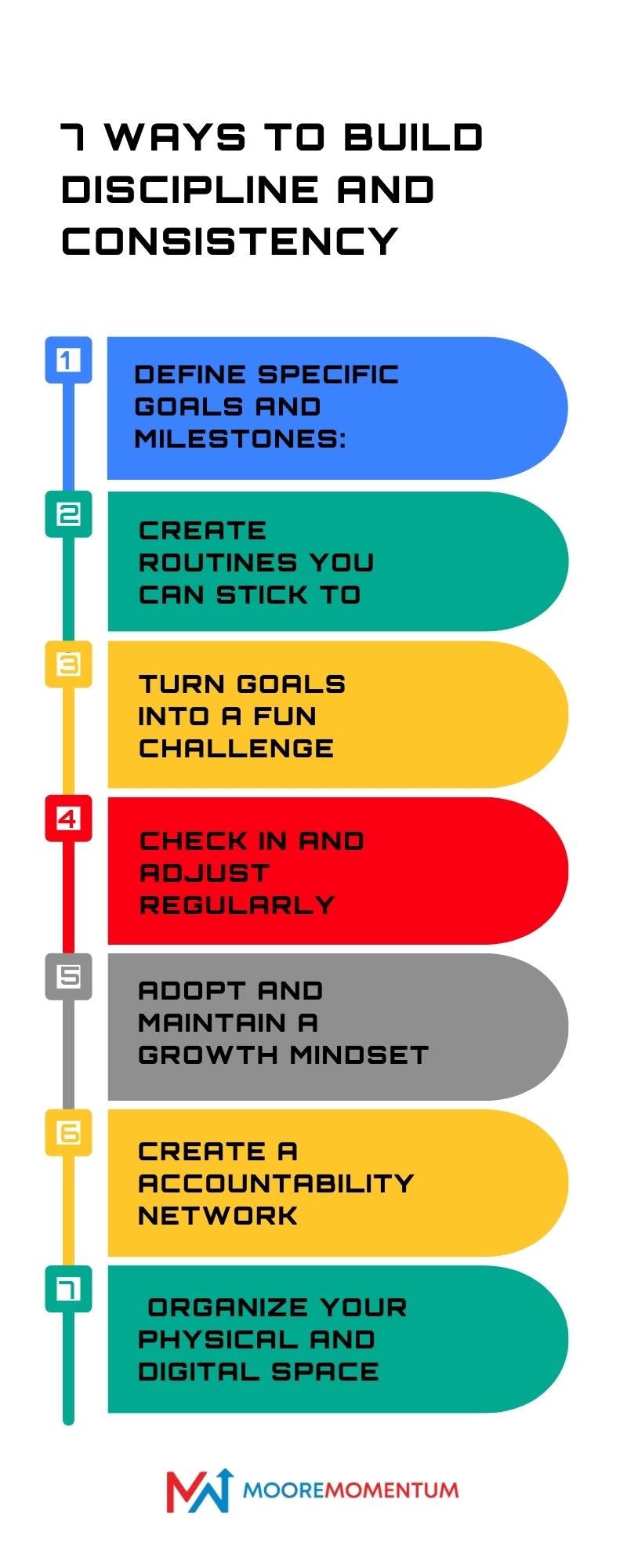
How To Build Discipline and Consistency: 7 Proven Strategies
Oct 20, 2025
By Will Moore
Struggling to stick to your goals even when you know what to do? You’re not alone. The real difference between people who achieve lasting success and those who quit isn’t talent or motivation—discipline and consistency are the key to success.
In this guide, you’ll learn how to build discipline and consistency step by step, using science-backed strategies that actually work in daily life. From creating keystone habits to training your mind for self-control, these methods will help you start, follow through, and keep going long enough to see real results.
If you’re ready to stop relying on willpower and build a system that makes staying disciplined effortless, let’s dive in.
Discipline Vs Consistency
In a nutshell, the difference between discipline and consistency is: Discipline is the ability to make yourself take action, even when you don't feel motivated. It's the willpower to start something new.
Consistency is the ability to sustain that action over an extended period of time. It's the habit of regularly following through.
In other words, Discipline gets you going, while consistency keeps you going. In his book Atomic Habits, James Clear simplifies this by saying, "Discipline is how you kickstart a new behavior, but consistency is how you make it stick." Understanding this difference is crucial; discipline pushes you out of your comfort zone to try new things, while consistency helps solidify those efforts into routines.
Why Is Consistency and Discipline Important?
Discipline and consistency is the key to success because they form the backbone of growth and achievement, helping you level up in every area of life.
Achieving Long-Term Goals: Regular, disciplined efforts create cumulative progress. Consistent study habits drive academic success, and steady work builds professional growth.
Building Trust and Reliability: Being consistent and disciplined makes you reliable. Meeting deadlines and maintaining high standards strengthens your reputation and opens doors to career advancement.
Developing Mastery: Discipline is key to mastery. As Malcolm Gladwell’s 10,000-hour rule suggests, expertise comes from dedicated, sustained practice—even when progress feels slow.
Enhancing Self-Esteem and Confidence: Achieving goals builds confidence. Discipline keeps you committed when motivation fades, boosting self-esteem and encouraging you to take on new challenges.
Creating Beneficial Habits: Discipline helps form keystone habits. Saving money consistently leads to financial security, and eating with discipline improves health. Once established, these habits require less effort to maintain.
Reducing Stress and Increasing Predictability: Consistent routines simplify life, reduce uncertainty, and lower stress, making time management and responsibilities easier to handle.
Read More: How to Take Action

7 Science-Backed Strategies to Build Discipline and Consistency
1. Define Specific Goals and Milestones:
Establishing clear goals is fundamental to maintaining consistency in your professional endeavors. By delineating what you wish to achieve and setting milestones along the way, you anchor your daily actions to these objectives.
Research by Locke and Latham demonstrates that setting challenging but attainable goals can lead to up to 90% better performance compared to easy, vague, or "do-your-best" goals. Additionally, studies show that people who write down their goals are 33% more successful in achieving them than those who don’t.
For example, instead of saying "exercise more," write down "complete 3 gym sessions per week for 8 weeks" with weekly check-ins. This specific, written goal with clear milestones creates the foundation for consistent action and measurable progress.
Read More: How to Stop Failing at Life
2. Leverage Existing Habits to Build New Ones:
Building new, good habits on the foundation of existing ones, aka habit stacking, is a strategic method for developing good habits. If your evening routine typically includes reading, add a brief session of planning for the next day’s important tasks. This pairing creates a natural trigger that enhances self-discipline.
As James Clear, author of Atomic Habits, suggests, the environment you create around you often determines the habits you foster, making it crucial to intentionally design routines that reinforce your desired behaviors.
3. Incorporate Elements of Play and Competition:
Introducing gamification to your routine can make maintaining discipline an engaging and enjoyable experience. By setting up a rewards system for completing tasks or achieving goals, such as consistent self-discipline in managing your workload, you can transform mundane activities into exciting challenges. This method not only makes the process of self-improvement fun but also ensures that you remain consistent in your efforts.
Read More: Life is Just a Game
4. Regularly Evaluate and Adjust Your Progress:
To practice consistency effectively, it’s important to assess your progress regularly. This reflective practice allows you to stay flexible and adapt your strategies, ensuring that you are always moving toward your goals. Research shows that habit strength reaches a plateau of automaticity after approximately 12 weeks and subsequently begins to gradually decline. This makes regular evaluation crucial—not just for tracking progress, but for maintaining the habits you've worked to build.
Regular evaluation acts as a feedback loop, reinforcing your self-control and helping you adjust your approach to overcome any emerging challenges.
Learn more about: How to Use The Compound Effect to Create Unstoppable Momentum
5. Adopt and Maintain a Growth Mindset:
Embracing challenges as opportunities for growth is crucial for developing consistent self-discipline. This growth mindset, as advocated by psychologist Carol Dweck, helps transform setbacks into steps forward, encouraging continual self-improvement. It’s about recognizing that self-control and the ability to remain consistent are not innate traits but skills that can be developed through perseverance and resilience.
Read More: Growth Mindset Activities for Kids
6. Create a Supportive Accountability Network:
Sharing your goals and progress with a supportive network can significantly boost your motivation and enhance your ability to maintain discipline. Research shows that those who report weekly to an accountability person see a goal completion rate of 70% compared to 35% of those who tell no one.
Whether it’s weekly check-ins with a mentor or participating in a group focused on similar self-improvement goals, the encouragement and accountability provided by others are invaluable. This community aspect helps solidify the good habits you’re forming and dissuades the retention of bad habits.
7. Optimize Your Physical and Digital Environments:
An orderly environment supports disciplined behaviors and promotes focus on important tasks. Research shows that clutter reduces cognitive performance and makes it more difficult to focus, with 72% of people experiencing stress when around clutter
Organizing your workspace and digital areas makes it easier to maintain the routines that contribute to your overall goals, such as physical health or consistent exercise. This strategic organization reduces the friction of starting tasks, making it more likely that you will stick to your planned activities and solidify them as part of your routine.

How to Stay Disciplined in Life (Even When Motivation Fades)
Learning how to stay disciplined is often harder than starting. Motivation fades, but habits and systems keep you going. A simple way to ensure you’re staying disciplined is to anchor new habits to existing ones. For instance, review your goals right after brushing your teeth or stretch for five minutes after making coffee.
Slip-ups are normal, but knowing how to regain discipline quickly matters more than avoiding mistakes entirely. Reflect on what went wrong, adjust your system, and get back on track the next day. This approach makes it easier to get disciplined again without feeling defeated.
For getting better discipline in life, one tip is to lower the barrier to action. Make tasks so small they’re impossible to skip. Reading one page instead of ten or doing one push-up instead of a full workout may seem trivial, but it keeps the momentum alive. Over time, these small wins add up, helping you become more disciplined and making discipline a part of your identity.
Read More: Motivation Vs. Discipline: The Ultimate Guide to Achieving Your Goals
How to Improve and Increase Discipline Over Time
Once you’ve built some discipline, the next step is to focus on improving discipline gradually. Tracking your progress is essential. A visual tracker or habit tracker app gives you immediate feedback, which motivates you to keep going.
To have better discipline, link it to rewards that matter to you. For example, allow yourself extra leisure time only after completing key tasks. This method works because it connects immediate satisfaction to long-term goals.
One hack to increase self-discipline is reducing decision fatigue—plan your tasks ahead, prepare your workspace, and batch similar tasks. Even small steps to streamline your day help you get better at self discipline, making consistency feel effortless.
5 Powerful Consistency and Discipline Quotes to Keep You Going
Need a push to stay on track? These timeless quotes from great thinkers and leaders prove that showing up every single day is what turns effort into success.
“Discipline is the bridge between goals and accomplishment.” – Jim Rohn
“Success doesn’t come from what you do occasionally, it comes from what you do consistently.” – Marie Forleo
“Discipline is choosing between what you want now and what you want most.” – Abraham Lincoln (attributed)
“With self-discipline, anything is possible.” – Theodore Roosevelt
“We are what we repeatedly do. Excellence, then, is not an act, but a habit.” – Aristotle
Conclusion - How to Be Disciplined and Consistent:
Developing discipline and consistency is achievable through intentional daily practices. By defining clear goals, leveraging existing habits, incorporating gamification, regularly evaluating progress, maintaining a growth mindset, building accountability networks, and optimizing your environment, you create a foundation for sustained success. Remember, discipline initiates action while consistency sustains it. These aren't innate traits but skills that can be developed. Start implementing these science-backed strategies today, and watch as your aspirations transform into lasting achievements through the power of disciplined, consistent effort.
🚀 READY TO MAKE DISCIPLINE FEEL EFFORTLESS INSTEAD OF EXHAUSTING?
You just learned the science behind building discipline and consistency—but here's what most people miss: these strategies work even better when they're part of a complete system that makes staying disciplined feel like playing a game instead of grinding through willpower.
👉 Take the Core Values Quiz to discover exactly where your discipline is breaking down—and get your personalized roadmap to fix it across all 5 Core Areas of Life and help you live a balanced and fulfilling life.
In under 60 seconds, you'll uncover your Momentum Score, identify the hidden friction points sabotaging your consistency, and unlock the Moore Momentum System—the AI-powered platform that transforms the discipline strategies you just learned into an engaging, rewarding adventure. No more relying on motivation or beating yourself up when you slip. Just science-backed habits, gamified tracking, and a system that evolves with you.
Start Building Unstoppable Discipline NOW!
🚀🚀🚀 Don't forget to check out our RESOURCE ARCADE 👾🎮 for FREE templates and tools to gamify your habits.
FAQs - Discipline and Consistency
How To Be Disciplined in Life?
Build discipline through small, consistent actions rather than dramatic changes. Set specific, clear rules for yourself and remove temptations from your environment. Track your progress daily to maintain momentum. When you slip up, get back on track immediately without self-judgment. Connect your disciplined habits to your deeper values and long-term goals. Use external accountability through friends or mentors. Focus on systems and routines that make good choices automatic, reducing reliance on willpower alone.
How Long Does It Take to Build Discipline?
Building discipline varies for everyone, but most habits take 30 to 90 days to feel automatic. The timeline depends on how complex the habit is and how consistent you are. The best way to speed up the process is to start small—doing something for even two minutes daily counts. Over time, these actions compound, helping you become disciplined without relying on motivation.
What Are the Best Self Discipline Tips?
The best self discipline tips include:
Reducing friction by making good habits easy and bad ones harder.
Tracking your progress visually to stay motivated.
Rewarding yourself after completing key tasks.
Surround yourself with people who encourage disciplined behavior.
Focusing on one habit at a time to avoid burnout.
These simple changes strengthen your ability to stay consistent and gradually build self discipline.
How to discipline your mind?
Developing a disciplined mindset means reframing challenges as opportunities and temptations as growth tests, which helps you cultivate discipline by choosing long-term rewards over instant gratification. Begin with awareness - catch yourself before you procrastinate or give in to impulses, then pause to choose your response consciously.
Strengthen your mental muscle through daily practices like mindfulness, visualization, or journaling. These habits help you build a disciplined mind that naturally resists distractions and stays committed to your goals.
How Do I Discipline Myself Daily?
To discipline yourself daily, set clear rules and stick to them. Break tasks into tiny steps, celebrate small wins, and review your progress each night. Over time, these routines train your mind to choose discipline automatically, making it easier to live a disciplined life.
How to Be More Self-Disciplined?
To be more self disciplined, focus on creating systems instead of relying on willpower. Prepare for distractions in advance—if you tend to procrastinate, block distracting apps or set a timer for focused work. Also, remind yourself of your bigger “why.” When you connect your actions to something meaningful, staying disciplined becomes easier. With consistent practice, you’ll notice an increase in your ability to have more self discipline over time.
Can I Become Disciplined if I’ve Failed Before?
Absolutely. Learning how to regain discipline after setbacks is part of the process. Start by identifying why you lost momentum and remove that obstacle. Go back to the basics—one small habit at a time. Remember, even highly disciplined people fail occasionally, but they succeed because they restart quickly. The faster you get back on track, the sooner you’ll become more disciplined.
What is the difference between discipline and motivation?
Discipline is the ability to make yourself do something regardless of how you feel motivated. Motivation is an emotional state that provides the desire or willingness to do something. Discipline enables action even in the absence of motivation.
Can you be disciplined without consistency?
No, true discipline requires consistency over time. Isolated bursts of self-control are not disciplined - discipline implies sustained action and follow-through. Consistency is what separates discipline from mere willpower.
How to be disciplined without motivation? What does it mean to be consistent in discipline?
To be disciplined without motivation requires developing systems, routines and habits that make the desired behavior automatic rather than relying on motivation. Being consistent in discipline means performing the disciplined action repeatedly, sticking to the routine regardless of how you feel on a given day.
What is the key of discipline?
The key to discipline is developing the mental fortitude and self-control to override momentary impulses, emotions and distractions in order to take valued action. Having a strong "why" or purpose behind the disciplined behavior is also crucial for sustaining motivation long-term.
How to Maintain Discipline?
Maintaining discipline is about building systems, not relying on willpower alone. Start with one small, specific habit and design your environment to support it. Create clear rules, track your progress visually, and plan for setbacks in advance. Connect your disciplined behaviors to deeper values and goals. Use accountability through friends, groups, or mentors. Focus on consistency over perfection - small, sustainable changes compound into significant long-term transformation.
